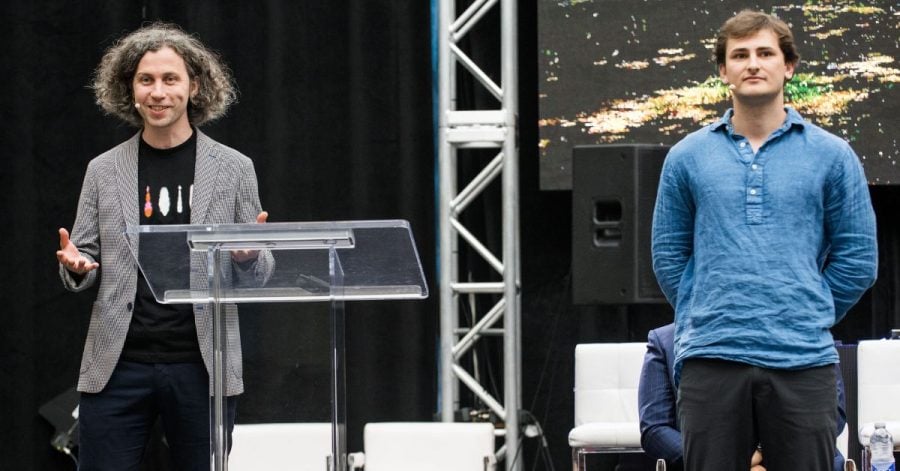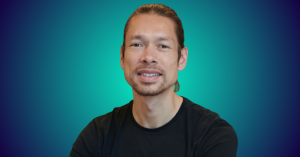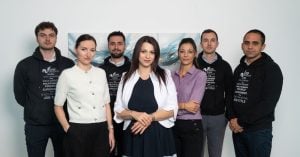If you are a deep tech startup, you are most likely pouring your heart and soul into developing complex technology while simultaneously navigating the challenging path of fundraising. It’s a rough journey, filled with highs and lows, but nevertheless you’re determined to make your mark on the world.
However, there’s one major hurdle that sets you apart from most startups: you’re based in Ukraine, a country that has been embroiled in a devastating war during the past year and a half, and where everyday conditions are harsh to put it mildly
Haiqu is one of the deep tech startups from Ukraine grappling with this reality. They are building software to enhance the performance of quantum processors. During last month, Haiqu also closed a $4M pre-seed financing round.
Working on both segments, the technology itself and the fundraising wasn’t an easy feat, Haiqu’s CTO Mykola Maksymenko tells The Recursive.
However, as Maksymenko puts it, every challenge is an opportunity, and Haiqu experienced this in full.
“Travel out of Ukraine is limited and I had no business trips or summer holidays lined up. So I used this as a chance to participate in an online bootcamp of a Creative Destruction Lab accelerator and focus on refining the idea of a startup. This is where we met with my co-founder Richard Givhan and founded Haiqu last year,” Maksymenko explains.
When they needed to have a meeting with their investors during last winter, everything was done either by using a diesel generator or through Starlink.
“If someone was freaked out by this – these are probably not the right people to associate our long-term strategy with. Quantum is a generally risky field and we need to have trustful and supportive partners. One famous US bank complained about high risks of the founder being in Ukraine and initially refused opening the account. Ironically, this bank just collapsed a month after. Notice that no Ukrainian banks collapsed during the war,” Maksymenko says.

As traveling around the country is a challenge, what Haiqu needed to do is to establish an efficient remote working culture.
“This helps us now to connect to high-profile talent globally and reduce the quantum talent risk. This is very common with other startups in Ukraine, who immediately have to become global. In the regions that are further away from the frontline or border with the terrorist state (west and central Ukraine) engineers can continue the daily operations in a relatively safe environment, thanks to our defenders in the frontline. Also, by growing Haiqu’ R&D capabilities in Ukraine we ensure that the country has a strong position in quantum computing to become a strategic hub in this niche,” he points out.
And the talent for deep tech startups is definitely there – in fields such as AI, quantum computing, space tech, electric and mechanical engineering, and so on. According to Maksymenko, who himself has a background as a researcher at the Max Planck Society and the Weizmann Institute of Science and head of R&D at global consultancy SoftServe, while some of these people may have joined the military, the majority of them still continue to contribute to the economy.
“Many of these talents also joined a growing number of military tech initiatives that will likely become a defining industry in a post-war Ukraine,” he adds.
AI startup Osavul is another Ukrainian deep tech startup that was founded during the war. Specializing in information security, countering disinformation, and information environment assessment, the startup faced different challenges when it came to developing its tech.
“In the last 6 months, Ukraine experienced more than 250 disinformation attacks. Russia seeds the information on different platforms, and websites, in closed online communities. Considering such a scale, it is challenging to identify threats before they become too big. We employ AI to solve the scale issues,” the company says in a statement.
Additionally, there is the level of how these disinformation campaigns are being disseminated on different platforms.
“Also, worth noting is the high level of sophistication of disinfo campaigns, involving different platforms: both public (Twitter, media) and private (communities in Telegram), different languages, and different tactics. Access to ChatGPT and other language models is also a kind of challenge. Before ChatGPT appeared, bots in social media were relatively easy to identify. Production of content was expensive, which is why bots pushed similar texts. Now because of ChatGPT, producing high-quality human-like posts at scale became possible. We already see that generative AI is applied, and it makes countering disinfo challenging,” Osavul’s founders note.
More capital needed to pour into deep tech
Haiqu’s round was joined by three Ukrainian VC companies, and for investors themselves, what the country needs now is definitely for more capital to be poured in deep tech startups.
“If a startup has no sales outside of Ukraine and its core team is in Ukraine, it is almost impossible to raise funding nowadays. But more mature startups with proven traction are securing funding. Examples include airSlate, which secured $51.5 million and is now valued at over $1.25 billion, and Preply, with $50 million raised in a Series C round. Finmap and FuelFinance have secured $1 million each,” says Oleksii Vitchenko, founder of Digital Future VC, a Ukrainian-based venture capital firm focusing on seed and early stage investments in tech companies with Ukrainian DNA.
According to Vitchenko, another bottleneck is unavailability for men to cross the border.
“Therefore, the mechanism of short-term business trips abroad for men who occupy key positions in the company should be streamlined already today. This will expand opportunities to attract new customers and conclude new contracts,” Vitchenko added.
For startup founders such as Maksymenko, free traveling can indeed be more beneficial for both startups and investors.
“Limited possibility to travel often limits founders to just video calls. Offline interactions at conferences and events are clearly a more efficient way to establish connections. Some investors may be too sensitive to higher risks, so it is important to communicate clearly about the security situation in a safe part of the country, similarly as startups in Israel do,” he tells The Recursive.
Another issue that troubles Ukrainian founders is access to capital, especially when it comes to European funds, as one entrepreneur explains.
“As for funding for Ukrainian startups in Europe, I would say it simply does not exist. I’ve been here for a year, attended many events, applied to over 15 accelerators, and pitched to more than 20 investors and funds – yet, I found no assistance in PR, nor dialogue here. We’ve raised 2 European products from revenues coming from our Ukrainian product – and this is in a situation when the income itself is unstable. I don’t know what else to add. I’m open to dialogue, but I note that there are a large number of projects and talented IT teams in Ukraine looking for opportunities in the EU,” Denis Dmitrov, co-founder of electronic toll collection platform eTOLLs, tells The Recursive.
According to Dmitrov, he has also encountered additional challenges when it comes to hiring Ukrainian IT talent.
“One thing I have definitely encountered more than once is that there is some unspoken rule – not to hire Ukrainians, as they are physically in a “disadvantaged” zone. Speaking for my team, I’ll say that we will endure and we will win. And our guys are doing such cool things that I am very proud of them. I would be happy if something changes in terms of financing,” Dmitrov tells the Recursive.
At the same time, the country needs to actively improve its investment climate, Dmitry Zarakhovych, managing partner at online payment portal UAPAY and fintech startup IGAMA, points out.
“Under certain conditions, various government programs and initiatives like Diia.City are aimed at supporting startups and attracting investment. With the will and understanding of the importance of this sector, the availability of financing can improve, which will facilitate the development of deep-tech startups,” he tells The Recursive.
Overall, Ukraine’s potential to create innovative deep tech startups can also provide a boost to the development of its post-war economy and attract IT professionals to return to the country, Maksymenko notes.
“Seeing the everyday bravery and sacrifices of our family members and friends who fight in the frontline motivates us to achieve outstanding results and make sure these people will return to a modern and future-looking country. Deep tech could provide an exponential boost to the post-war economy,” he concludes.








